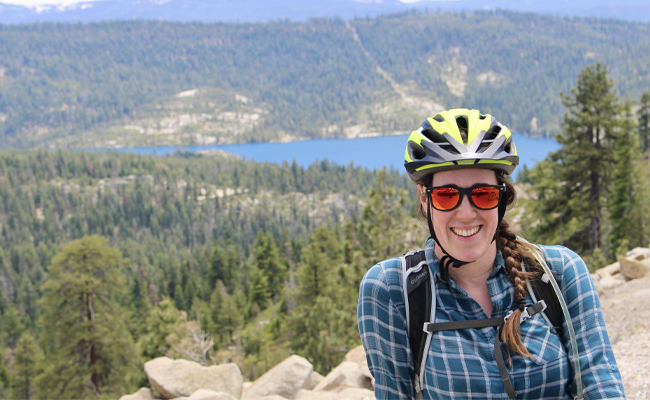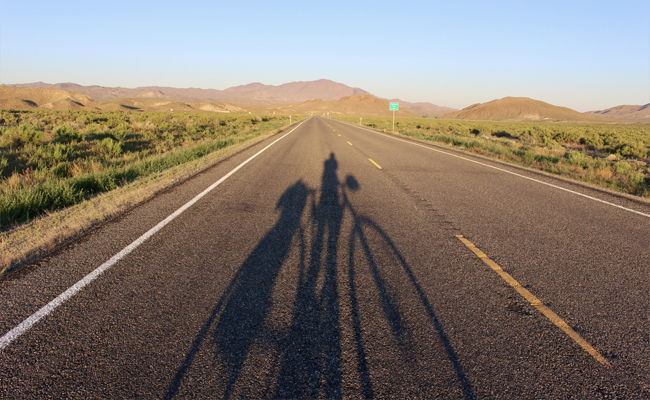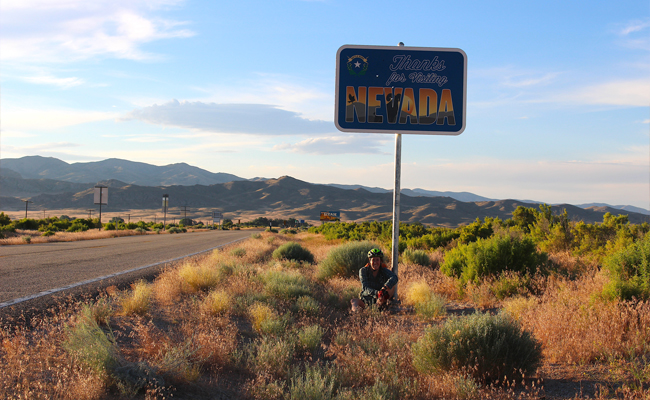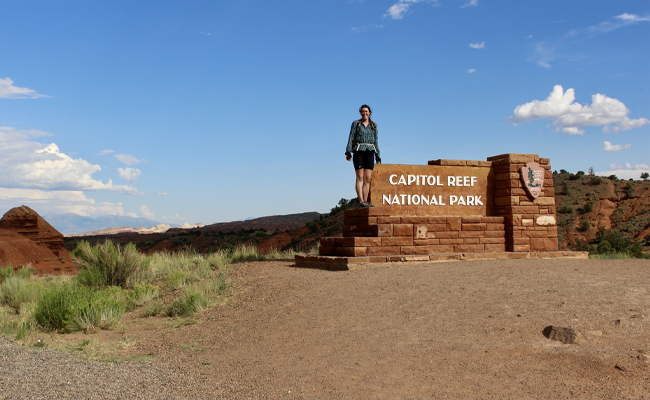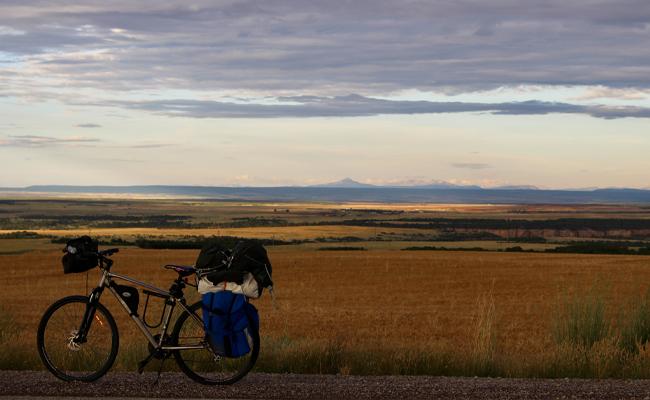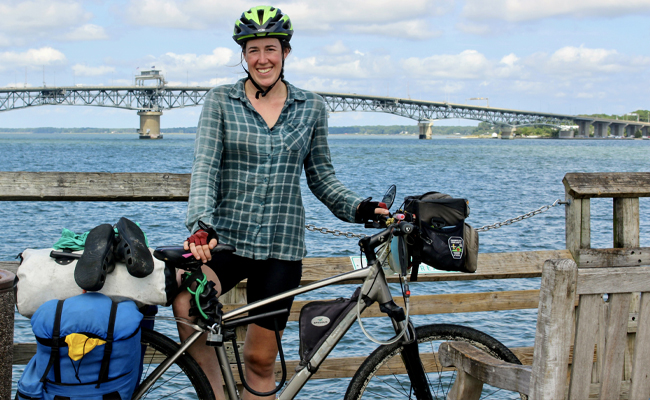With no cycling experience and no fitness training, Otago alumna Anna Welch bought a bike, packed it as if she were going tramping, and set off to cycle solo across the United States (US).
“I just really wanted a bit of adrenalin in my life, I was tired of being comfortable,” says the English Literature honours graduate, who not only completed the journey but has recently received the 2023 Waterston Desert Writing Prize in Oregon for her account of her experiences along the way.
After graduating from Otago in 2015, Anna worked in an outdoors shop and as a gardener, before getting a job with the Department of Conservation in Arthur’s Pass.
“I had this idea I would be up in the mountains, in the solitude, and it would be a really good place to write. Having a full-time job scuppered that theory.”
What she did have time for however was reading, and it was a book by Canadian author Kate Harris, Lands of Lost Borders, about cycling the Silk Road in Central Asia which fired her enthusiasm for a bike trip.
“She mentioned she’d done this trip across America as a training run and I thought ‘that sounds like an idea’.
“I had no idea if I could do it, it was totally unknown. It scared me enough that it fulfilled that requirement for adrenalin but also seemed just possible enough I would make plans and put it into motion.”
The most biking she’d done previously was a kilometre each way to work in Arthur’s Pass, on a rusty old bike dragged out from under her neighbour’s house.
All up, the planning for her 2019 trip took about three months. She bought a touring bike in Christchurch, and before leaving went on a 30km trip to make sure she had her gear balanced properly. Although a novice cyclist, she is an experienced tramper, and says when deciding what to take she applied the same approach as preparing for a challenging tramp, and packed all that onto a bicycle.
“I didn’t train at all, I started [the trip] with slow days and worked my way up once I got going. Somehow, I got away with it.”
Anna’s 5,954km trip across the US took her 83 days. She took a shortcut from the usual Trans-America Cycle route, to save 800km and make sure she made the journey within her visa timeframe. A less-travelled route, she met only five other cyclists during this stretch, all travelling in the opposite direction.
“I didn’t really mind the aloneness. The only time it bothered me was in situations where there’s another person and you don’t know if you can trust them, those times I thought ‘oh god is this a bad idea’?”
Like every long-distance cyclist, she had to cope with saddle sores, head winds and hills, but the biggest challenge turned out to be something she hadn’t anticipated.
“The hardest bit was oddly the flattest bit, which was in the prairies, in eastern Colorado and Kansas. I ended up there right in the middle of their thunderstorm season. You’re basically on this little metal lightning rod, cycling along, you’re the only thing higher than a corn stalk for miles and miles in any direction and then there are these great bolts of lightning sticking up a mile away from you. That was quite challenging to say the least.
“It’s an odd kind of fear because you can’t do anything about it, you can’t fight back. You just have to hope that nothing hits you. I spent one night sheltering in a long-drop toilet, clutching my sleeping bag for two hours while rain and lightning flashed around outside.”
After crossing the deserts of Nevada and Utah, she rejoined the main Trans-America trail and met more cyclists travelling in both directions. She averaged a flat tyre every couple of days, but otherwise nothing else went wrong, which she was grateful for as she says she’d have had no idea how to fix her bike.
When Anna finally rolled into Yorktown, Virginia, on the east coast of the US, she says she actually felt a bit flat. “I feel like the finishing was just ‘oh ok I’m here, what’s next, let’s get on the train, go to the next place’. That was quite anticlimactic.”
But along the way she had discovered an appreciation for travelling under her own steam, on two wheels.
“It’s a wonderfully freeing feeling, getting on a bicycle, you feel like you can outrun the world.”
During the trip, Anna began to write about her experiences, dropping into libraries to use the computers. Originally, she’d planned to publish her stories on a website, but as time went on the writing began to shape itself into a book.
Her stories and book proposal formed her submission to the Waterston Desert Writing Prize: ‘Momentum: A Trans-Continental Bicycle Journey’, which includes her encounter with her first desert, The Great Basin Desert.
The Waterston Prize was established in 2014 by author and poet Ellen Waterston, inspired by her love of the High Desert regions of the US. The US$3,000 prize is now administered by the High Desert Museum in Oregon and aims to support authors to complete their proposed manuscripts.
Anna also received a residency at PLAYA Summer Lake centre in Oregon, which focusses on the intersection of art and science, and a reading and reception at the High Desert Museum Board in Oregon.
“I went over to Oregon last month to visit the museum and accept the award. That was very wonderful to meet everyone there and meet the founder of the prize and people at the museum who organise it.”
Anna describes her book as “part travel memoir, part fusion of science, natural history and philosophy. It is a love song to the joy and the magic of the perpetual motion inherent in the world”.
So far, the writing of the book has spanned four years, seven countries and countless libraries, cafes, bedrooms, kitchen tables, offices, tents and hillsides.
She has about 200 pages of the 250-300 page book completed, the bulk of which was written in Spain and London after her biking trip, and back in Arthur’s Pass during COVID. She hopes to start publishing chapters as stand-alone pieces in magazines and journals, to try and drum up some interest in the book and earn a bit of income along the way.
Currently living in Scotland, Anna is working for a native tree nursery which is involved in a forest restoration project around Loch Arkaig and for an environmental consultancy doing wildlife and habitat surveys. “Which are pretty much my perfect jobs.”
“It took me a long time to work out science and art are not necessarily enemies and can feed into each other in a big way. I think the prevalence of nature writing now has really helped that understanding.”
You can read more about Anna’s writing here https://www.annakwelch.com/
Kōrero by Margie Clark, Communications Adviser, Development and Alumni Office
